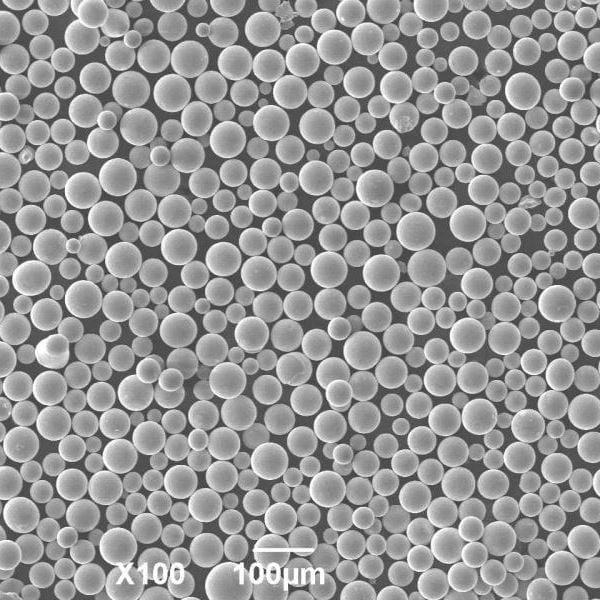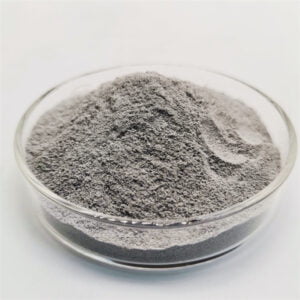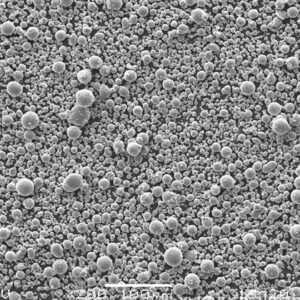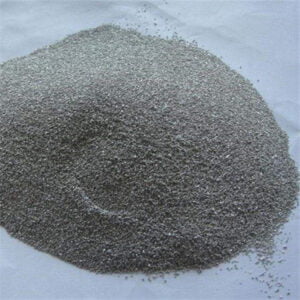D2 Powder
D2 powder is a cold work tool steel powder offering an excellent combination of high hardness, wear resistance, and toughness. It is a versatile chromium-molybdenum-vanadium alloy widely used for pressing into cutting tools, dies, precision parts, and wear components across industrial sectors.
Low MOQ
Provide low minimum order quantity to meet different needs.
OEM & ODM
Provide customized products and design services to meet unique customer needs.
Adequate Stock
Ensure fast order processing and provide reliable and efficient service.
Customer Satisfaction
Provide high quality products with customer satisfaction at the core.
share this product
Table of Contents
Overview of D2 Powder
D2 powder is a cold work tool steel powder offering an excellent combination of high hardness, wear resistance, and toughness. It is a versatile chromium-molybdenum-vanadium alloy widely used for pressing into cutting tools, dies, precision parts, and wear components across industrial sectors.
Key properties and advantages of D2 powder include:
D2 Powder Properties and Characteristics
| Properties | Details |
|---|---|
| Composition | Fe-1.5Cr-0.3C-0.4V-1Mo alloy |
| Density | 7.7 g/cc |
| Particle shape | Spherical or irregular |
| Size range | 10-150 microns |
| Apparent density | Up to 60% of true density |
| Flowability | Good |
| Hardness | 60-62 HRC when heat treated |
| Toughness | Very good |
D2’s exceptional combination of hardness, strength, and impact resistance make it the top choice for cold work tooling needing extended service life.
D2 Powder Composition
Typical composition of D2 tool steel powder:
D2 Powder Composition
| Element | Weight % |
|---|---|
| Iron (Fe) | Balance |
| Chromium (Cr) | 11-13% |
| Carbon (C) | 1.4-1.6% |
| Molybdenum (Mo) | 0.75-1.2% |
| Vanadium (V) | 0.7-1.2% |
| Manganese (Mn) | 0.3-0.6% |
| Silicon (Si) | 0.15-0.4% |
- Iron provides the ferritic matrix
- Chromium contributes to hardness and wear resistance
- Carbon enables high hardness in heat treated condition
- Molybdenum and vanadium form carbides enhancing wear resistance
- Manganese and silicon improve solid solution strengthening
The composition is designed to achieve an optimal combination of hardness, toughness and grindability required in tooling applications.
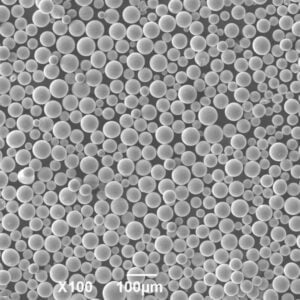
D2 Powder Physical Properties
D2 Powder Physical Properties
| Property | Value |
|---|---|
| Density | 7.7 g/cc |
| Melting point | 1460-1500°C |
| Thermal conductivity | 21 W/mK |
| Electrical resistivity | 0.7 μΩ-m |
| Curie temperature | 1010°C |
| Maximum service temperature | 180-200°C |
- High density provides component miniaturization capabilities
- Retains high hardness and strength at elevated temperatures
- Becomes paramagnetic above Curie point
- Relatively low service temperature due to tempering effect
The properties allow D2 to be used in cold work tooling applications at high hardness levels.
D2 Powder Mechanical Properties
D2 Powder Mechanical Properties
| Property | Value |
|---|---|
| Hardness | 60-62 HRC |
| Transverse rupture strength | 1900-2100 MPa |
| Tensile strength | 2050-2200 MPa |
| Yield strength | 1700-1900 MPa |
| Elongation | 8-11% |
| Impact toughness | 12-15 J/cm2 |
- Exceptional hardness when heat treated
- Very high strength with reasonable ductility
- Excellent impact toughness for a tool steel
- High fatigue strength for extended tool life
- Strength and ductility values depend on heat treatment
The properties make D2 suitable for the most demanding cold work tooling and die applications requiring extreme wear resistance.
D2 Powder Applications
Typical applications of D2 tool steel powder include:
D2 Powder Applications
| Industry | Example Uses |
|---|---|
| Manufacturing | Press tooling, punch and dies |
| Automotive | Blank, pierce, trim, and forming dies |
| Aerospace | Forming dies, fixtures |
| Consumer goods | Razors, knives, scissors |
| Industrial | Drawing dies, thread rolling dies |
Some specific product uses:
- Cold heading dies for fastener manufacturing
- Coining dies for minting precise parts
- Thread rolling dies for bolt production
- Draw, punch, blanking dies across sectors
- Surgical tools and cutlery
- Pelletizing tooling
D2 is the premier powder metal tool steel preferred for the longest lasting cold work tooling, metal forming dies, and precision components across all industries.
D2 Powder Specifications
Key specifications for D2 tool steel powder:
D2 Powder Standards
| Standard | Description |
|---|---|
| ASTM A681 | Standard for tool steels alloys |
| DIN 1.2379 | Equivalent to AISI D2 |
| JIS G 4404 | Cold work tool steels |
| ISO 4957 | Tool steels |
| GOST 5950 | Tool steel grades |
These define:
- Chemical composition limits of D2 steel
- Required mechanical properties in heat treated condition
- Permissible impurities
- Approved production methods like gas atomization
- Compliance testing protocols
- Packaging, identification requirements
D2 powder made to these specifications ensures suitability for tooling applications requiring maximum wear resistance, impact toughness and dimensional stability.
D2 Powder Particle Sizes
D2 Powder Particle Size Distribution
| Particle Size | Characteristics |
|---|---|
| 10-22 microns | Ultrafine grade provides highest density |
| 22-53 microns | Most commonly used size range |
| 53-105 microns | Coarser size provides good flowability |
- Finer particles allow greater densification during sintering
- Coarser particles improve powder flow into die cavities
- Size is selected based on final part properties needed
- Both gas and water atomized particles used
Controlling size distribution optimizes pressing behavior, sintered density, and final component performance.
D2 Powder Apparent Density
D2 Powder Apparent Density
| Apparent Density | Details |
|---|---|
| Up to 60% of true density | For spherical powder morphology |
| 4.5-5.5 g/cc typical | Higher density improves flow and compressibility |
- Spherical powder shape provides high apparent density
- Irregular powder has lower density around 50%
- Higher apparent density improves press fill efficiency
- Enables easier compaction into complex tool geometries
Higher apparent density leads to better manufacturing productivity and component quality.
D2 Powder Production Method
D2 Powder Production
| Method | Details |
|---|---|
| Gas atomization | High pressure inert gas breaks up molten alloy stream into fine droplets |
| Vacuum induction melting | High purity input materials melted under vacuum |
| Multiple remelting | Enhances chemical homogeneity |
| Sieving | Classifies powder into different particle size fractions |
- Gas atomization provides spherical powder shape
- Vacuum melting eliminates gaseous impurities
- Multiple remelting improves uniformity
- Post-processing allows particle size customization
Fully automated processes combined with strict quality control ensures reliable and consistent properties of D2 powder critical for tooling performance.
D2 Powder Pricing
D2 Powder Pricing
| Factor | Impact on Price |
|---|---|
| Purity level | Higher purity increases cost |
| Particle size | Ultrafine powder more expensive |
| Order quantity | Price decreases with larger volume |
| Powder properties | Higher density powder costs more |
| Additional services | Customization adds cost |
Indicative Pricing
- D2 spherical powder: $15-25 per kg
- D2 irregular powder: $10-20 per kg
- Large volume pricing can be 40% lower
Pricing depends on purity, particle size and shape, order quantity, density, and any additional customization.
D2 Powder Suppliers
D2 Powder Suppliers
| Company | Location |
|---|---|
| Höganäs | Sweden |
| Erasteel | USA, Europe |
| Carpenter Powder Products | USA |
| Sandvik Osprey | UK |
| Jingdong New Material | China |
| CNPC Powders | China |
Key supplier selection factors:
- Powder grades offered
- Production capacity
- Particle size distribution
- Powder characterization and testing
- Pricing and minimum order quantity
- Packaging and lead times
- Customer technical support
D2 Powder Handling and Storage
D2 Powder Handling
| Recommendation | Reason |
|---|---|
| Ensure adequate ventilation | Prevent exposure to fine metal particles |
| Wear protective gear | Avoid accidental ingestion |
| Ground all equipment | Prevent static sparks |
| Avoid ignition sources | Flammable dust risk |
| Use non-sparking tools | Prevent ignition during handling |
| Follow safe protocols | Reduce fire, explosion, and health risks |
Storage Recommendations
- Store sealed containers in a cool, dry area
- Limit exposure to moisture, acids, chlorides
- Maintain temperatures below 27°C
Proper precautions during handling and storage help preserve purity and prevent health or fire hazards.
D2 Powder Inspection and Testing
D2 Powder Testing
| Test | Details |
|---|---|
| Chemical analysis | Verifies composition using optical or ICP spectroscopy |
| Particle size distribution | Determines sizes using laser diffraction or sieving |
| Apparent density | Measured using Hall flowmeter as per ASTM B212 |
| Powder morphology | SEM imaging to determine particle shape |
| Flow rate analysis | Gravity flow rate through specified funnel |
| Tap density test | Density measured after mechanically tapping powder sample |
Testing ensures the powder meets the required chemical composition, physical characteristics, particle size distribution, morphology, density, and flow rate specifications.
D2 Powder Pros and Cons
Advantages of D2 Powder
- Exceptional hardness when heat treated
- Excellent wear and abrasion resistance
- Very high strength combined with good impact toughness
- Dimensional stability in cold work service
- Good grindability compared to other tool steels
- Relatively cost-effective
Limitations of D2 Powder
- Moderate corrosion resistance without surface treatment
- Limited high temperature strength and creep resistance
- Requires careful heat treatment by experienced providers
- Not weldable using conventional welding methods
- Large sections can experience embrittlement
- Brittle fracture mode limits cold formability
Comparison With S7 Tool Steel Powder
D2 vs S7 Tool Steel Powder
| Parameter | D2 | S7 |
|---|---|---|
| Hardness | 60-62 HRC | 63-65 HRC |
| Toughness | Very good | Good |
| Wear resistance | Excellent | Outstanding |
| Corrosion resistance | Moderate | Low |
| Cold strength | Excellent | Very good |
| Cost | Low | High |
- D2 has slightly lower hardness but much better toughness
- S7 provides the maximum wear resistance
- D2 has better corrosion resistance uncoated
- S7 has higher hot hardness and hot strength
- D2 is more cost effective
D2 Powder FAQs
Q: What are the main applications of D2 tool steel powder?
A: Main applications include cold pressing tooling, blanking and punching dies, coin minting dies, thread rolling dies, surgical tools, knives, industrial knives, and precision ground shafts and pins.
Q: What heat treatment is used for D2 tool steel powder?
A: D2 is typically heat treated by austenitizing at 1010-1040°C, quenching in oil or air, and tempering at 150-350°C to achieve a hardness of 60-62 HRC.
Q: How does vanadium improve the properties of D2 steel?
A: Vanadium forms fine carbides with iron and chromium that impart significant wear resistance and abrasion resistance while also enhancing impact toughness.
Q: What precautions should be taken when working with D2 powder?
A: Recommended precautions include ventilation, inert atmosphere, avoiding ignition sources, grounding equipment, using non-sparking tools, protective gear, and safe storage away from moisture or contamination.
Get Latest Price
About Met3DP
Product Category
HOT SALE
CONTACT US
Any questions? Send us message now! We’ll serve your request with a whole team after receiving your message.

Metal Powders for 3D Printing and Additive Manufacturing
COMPANY
PRODUCT
cONTACT INFO
- Qingdao City, Shandong, China
- [email protected]
- [email protected]
- +86 19116340731






